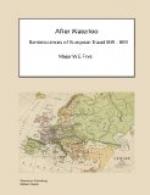The Abbe Delille, the best poet of our day that France has produced, has gone further; he had read and admired the best English poets such as Milton, Pope, Collins and Goldsmith, and has not disdained to imitate them; yet he has imitated them with such elegance and judgment that he has left nothing to regret on the part of those of his countrymen who are not acquainted with English, and he has rendered their beauties with such a force that a foreigner Versed in both languages who did not previously know which was the original, and which the translation, might take up passages in Pope, Thomson, Collins and Goldsmith and read parallel passages in Delille and be extremely puzzled to distinguish the original: for none of the beauties are lost in these imitations. And yet, in preferring to imitate, it must not be inferred that he was deficient in original thoughts.
To return to the theatre, I have seen Mlle Mars in the role of Henriette in the Femmes Savantes of Moliere. Oh! how admirable she is! She realizes completely the conception of a graceful and elegant Frenchwoman of the first society. She does not act; she is at home as it were in her own salon, smiling at the silly pretensions of her sister and at the ridiculous pedantry of Trissotin; her refusing the kiss because she does not understand Greek was given with the greatest naivete. In a word Mlle Mars reigns unrivalled as the first comic actress in Europe.
I have seen too, Les Plaideurs of Racine and Les fourberies de Scapin of Moliere, both exceedingly well given; particularly the scene in the latter wherein it is announced to Geronte that his son had fallen into the hands of a Turkish corsair, and his answer “Que diable allait-il faire dans la galere?”
I have seen also Andromaque, Iphigenie and Zaire. Mlle Volnais did the part of Andromaque; but the monotonous plaintiveness of her voice, which never changes, wearies me. In Iphigenie I was more gratified; for Mlle Georges did the part of Clytemnestre, and her sister, a young girl of seventeen, made her debut in the part of Iphigenie with great effect. The two sisters supported each other wonderfully well, and Lafond did Agamemnon very respectably.




